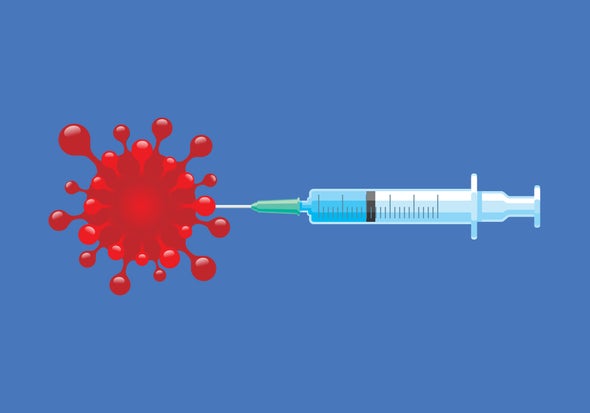Emergency use authorizations by the FDA are not ideal
The colder months have arrived, and COVID-19 infections and deaths are rising once again—but Americans are breathing a sigh of relief nonetheless, as the first authorized vaccine is finally rolling out. Perhaps surprisingly, though, that will actually make it increasingly difficult for public health officials to judge whether any of the vaccines will work well enough to tame the pandemic.
That’s because the emergency use authorization (EUA) the Food and Drug Administration (FDA) recently granted to
Pfizer will begin to
undermine the scientific integrity of the double-blinded clinical trial the company—and other companies—have been conducting, before statistically valid information can be gathered on how effectively the vaccines prevent hospitalizations, intensive care admissions or deaths. All that effort to recruit tens of thousands of volunteers and randomly give them either the vaccine or a placebo will get compromised as people in the placebo half are offered the opportunity to “cross over” and get the vaccine itself.
It’s widely reported that the Pfizer and Moderna vaccines “prevent COVID.” Many reporters, and even experts, claim that means they prevent infections, and suggest the pandemic will start to come under control as soon as we can administer the vaccine. But preventing infection was not a key measure of efficacy the
trials were designed to study. Nor were the trials designed to see whether the vaccines can reduce hospital and intensive care admissions, nor death. There is also no assurance of how well the vaccines work in the most important high-risk groups, like the elderly who reside in nursing homes, where nearly half of all deaths have
The FDA, which works closely with the vaccine companies and is paid by them for assessing vaccine candidates, set a low bar for certifying them as effective: to at least halve the risk of mild COVID, which has symptoms like a sore throat or cough. Pfizer, the first company to receive an EUA, says it aced this test, declaring 95 percent efficacy in a journal article. But
many unanswered questions remain. Out of 44,000 people, Pfizer’s results are based on just 170 confirmed cases. We still know nothing about the vaccine’s effectiveness at three, six or 12 months. Despite this, the FDA and its advisory panel—under intense pressure to quickly grant emergency use—announced on December 11 the authorization of Pfizer’s application for emergency use for everybody 16 years and older. (Four advisory committee members voted no—but 17 voted yes and 1 abstained.)
But there was another way to make an unapproved vaccine available to those who need it without undermining a trial. It’s called “expanded access.” Expanded access enables any clinician to apply on behalf of their patient to the FDA for a drug or vaccine not yet approved. The FDA almost always approves it quickly.
If the FDA and the companies joined together to pursue an expanded access program rather than emergency use, they would “
uphold the integrity of the scientific process” built into the full trial design, rather than undermining it with an EUA. Expanded access would keep the trial going intact while still allowing physicians to administer the vaccine candidate outside the trial to anyone with serious conditions when there is no comparable alternative. As one distinguished bioethics group advocating for expanded access recently
wrote, “Vaccination of high-risk individuals and clinical trials should proceed in concert, with doctors and eligible high-risk patients deciding when benefits of inoculation outweigh risks.”
By denying industry’s requests for an EUA and instead urging the company to mobilize its public relations and marketing power to urge patients and their physicians to use the expanded access program, the FDA could serve the public, hold companies to their ethical commitment and enable all of us to learn just how effective a vaccine is in preventing hospitalizations, intensive care or death. Ultimately, if the trials prove the vaccine has those benefits, the FDA can then approve it with full confidence that the benefits outweigh the risks. In the meantime, expanded access could provide a way to get the vaccine to those who cannot afford to wait for answers.
During the application process Pfizer said, should the EUA be granted, that it has an “
ethical responsibility” to unblind its trial and offer those who received a placebo the opportunity to receive its vaccine. But Pfizer’s application for emergency use violates its
ethical commitment “to uphold the integrity of the scientific process” built into its trial, leading to the mass deployment of a vaccine we still don’t know is capable of saving lives. The Biden administration says it is committed to ending the pandemic through evidence-driven decision making, but emergency use authorizations weaken the evidence base, while expanded access will strengthen it.
ABOUT THE AUTHOR(S)
Peter Doshi
Peter Doshi is an associate professor of pharmaceutical health services research at the University of Maryland School of Pharmacy and an associate editor of
The BMJ, a medical journal.
Donald Light
Donald Light is a visiting scholar at the Institute for Advanced Study and a professor of psychiatry and health policy at the Rowan School of Osteopathic Medicine. He is a faculty affiliate of the NYU Division of Medical Ethics.
 Credit:
Credit: 



Comments
Post a Comment